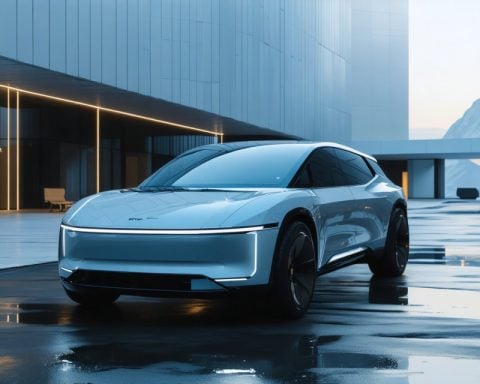India’s Evolving Electric Scooter Market
India’s electric scooter market is undergoing a dramatic transformation, as the competition intensifies. Once a dominant player, Ola Electric is now facing fierce challenges from established brands such as Bajaj Auto and TVS Motor Company.
Ola Electric, backed by SoftBank, has recently encountered serious setbacks that have impacted its reputation. Reports reveal a growing number of complaints regarding the quality of its scooters, with customers voicing concerns over mechanical failures and poor after-sales support. This decline in consumer satisfaction has eroded trust in the brand. Adding to the turmoil, changes in leadership have cast doubt on the company’s strategic direction, raising alarms about its future.
As the market landscape shifts, Ola Electric’s market share has reportedly dropped to 19%, trailing behind Bajaj Auto’s 25% and TVS Motor’s 23%. This trend reflects a wider consumer preference for tried-and-true brands that emphasize reliability and strong customer service.
The implications of this competition extend far beyond just sales figures. With electric scooters seen as a vital step toward reducing urban pollution, maintaining quality and sustainability is crucial for the industry’s growth. Job creation in related sectors, such as battery technology and software development, adds another layer of complexity to the evolving market.
As the industry watches eagerly, the question remains: Can Ola Electric innovate and reclaim its position, or will Bajaj and TVS continue to solidify their lead in India’s rapidly changing electric scooter market?
India’s Evolving Electric Scooter Market: A Catalyst for Change
The electric scooter market in India is not just a sector of the automobile industry; it represents a crucial step towards a sustainable future for the nation. As the competition heats up among key players like Ola Electric, Bajaj Auto, and TVS Motor Company, the implications of this battle extend far beyond sales and profits. The future of electric scooters holds significant consequences for human health, environmental sustainability, economic growth, and technological advancement.
Environmental Impact
Electric scooters are increasingly recognized as an essential component in combatting urban pollution, which has become a pressing issue in many Indian cities. The shift from internal combustion engine vehicles to electric vehicles (EVs) could drastically reduce air pollution, contributing to cleaner and healthier living conditions. The transition is vital for countries like India, where air quality often poses severe risks to public health, particularly in urban areas. By investing in and supporting quality electric scooters, the industry aligns with global efforts to combat climate change and reduce greenhouse gas emissions, paving the way for a more sustainable future.
Humanitarian Aspects
The evolution of the electric scooter market could also have profound effects on humanity in terms of accessibility and mobility. Electric scooters can provide an affordable, eco-friendly mode of transportation for millions, including those in rural and urban areas. Their adoption can enhance mobility, allowing individuals to access education, healthcare, and employment opportunities more easily. This connectivity is essential for promoting social equity and improving the overall quality of life, especially in underprivileged communities.
Economic Opportunities
The competition in the electric scooter segment is generating economic stimuli that extend into various sectors. The need for high-quality battery technology, software development, and related maintenance services creates job opportunities, fostering innovation and skill development. As companies strive to establish robustness alongside their electric offerings, they will likely spur advancements in technology and manufacturing processes. This multiplier effect can contribute to a sustainable economic growth cycle, ultimately benefiting the entire economy.
The Future of Humanity
As the world pivots towards renewable energy and electric mobility, the stakes are high for countries like India. The choices made by consumers, businesses, and policymakers today will dictate the trajectory of the nation’s economic and environmental future. If companies like Ola Electric can successfully innovate and regain customer trust, they could lead a broader transformation that values sustainability without compromising technological prowess and reliability.
Conversely, if established players like Bajaj and TVS continue to dominate without adequate pressure from new entrants, there could be stagnation in innovation, hindering the broader shift towards sustainable practices. The outcome of this competitive landscape will likely influence not only vehicle markets but also shape public attitudes towards sustainability and modernization.
In conclusion, India’s electric scooter market serves as a microcosm for larger global challenges and opportunities. Its evolution impacts the environment, shapes societal structures, drives economic change, and molds the future of transportation. The decisions made today by various stakeholders will be instrumental in steering humanity towards a more sustainable and equitable future. The electric scooter revolution is not just a trend; it is a critical component of humanity’s journey toward a greener planet.
Electric Scooters in India: A Market in Flux and Opportunities Ahead
India’s Evolving Electric Scooter Market
India’s electric scooter market is currently experiencing a significant transformation fueled by intensifying competition and shifting consumer preferences. The market landscape, once dominated by Ola Electric, is now characterized by a strong presence of traditional automotive giants such as Bajaj Auto and TVS Motor Company.
Overview of Market Dynamics
Bajaj Auto has captured approximately 25% of the market share, closely followed by TVS Motor with 23%. In contrast, Ola Electric has seen its share decrease to around 19%. This drop can be attributed not only to customer dissatisfaction due to quality concerns but also to the increasing brand loyalty enjoyed by these established rivals, who are prioritizing reliability and customer service.
Pros and Cons of Electric Scooters
Pros:
– Environmental Benefits: Electric scooters contribute to reduced urban pollution and lower greenhouse gas emissions.
– Cost Efficiency: With rising fuel prices, electric scooters can save owners money on fuel and maintenance.
– Government Incentives: India’s government has rolled out subsidies and incentives to promote electric vehicle adoption.
Cons:
– Quality Concerns: Brands like Ola Electric have faced issues regarding the mechanical quality of their scooters, impacting consumer trust.
– Charging Infrastructure: Adequate charging stations remain a significant challenge in many urban areas.
– Initial Costs: The upfront cost of electric scooters can still be higher compared to traditional counterparts.
Current Trends in the Industry
The electric scooter market is seeing increased investment in technology and infrastructure. Companies are focusing on:
– Innovation in Battery Technology: Improved battery technologies are being developed to enhance range and reduce charging time.
– Smart Features: Features such as GPS navigation, anti-theft systems, and app connectivity are becoming standard, attracting tech-savvy consumers.
– Sustainability: There is a growing emphasis on sustainable manufacturing practices to appeal to environmentally conscious buyers.
Challenges and Limitations
Alongside the advantages, there are notable limitations in the current electric scooter market:
– Service Network: Many newer companies struggle with providing a robust after-sales service network, causing customer frustration.
– Market Volatility: The market remains highly volatile due to fluctuating government policies regarding subsidies and tax incentives.
– Competition for Resources: The demand for lithium and other battery materials is increasing, leading to price fluctuations and supply chain issues.
Insights and Future Predictions
Industry analysts predict that as consumer awareness and the demand for sustainable transport options grow, the electric scooter market is poised for substantial expansion. The emergence of more startups focusing on electric mobility may disrupt traditional players further.
Furthermore, there is an increasing push for local manufacturing of electric vehicle components in India, aimed at reducing dependency on imports and enhancing job creation.
Conclusion
As the battle for market dominance heats up between Ola Electric, Bajaj Auto, and TVS Motor, the future of India’s electric scooter market remains uncertain but filled with potential. The key for Ola Electric will be to address its quality concerns and innovate in ways that resonate with consumers looking for reliability and sustainability. Meanwhile, Bajaj and TVS continue to leverage their established customer loyalty and operational efficiencies to solidify their positions in this dynamic landscape.
For readers interested in deeper insights into India’s electric vehicle strategy and industry developments, further information can be found on India’s official portal.

















